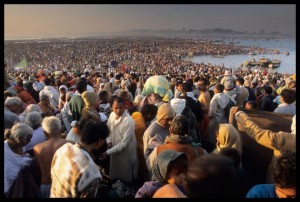The largest gathering ever in human history happened this year in 2013 – the Kumbh Mela festival which is celebrated only once every 12 years. A staggering 100 million people descended on the city of Allahabad by the shores of the Ganges River through the 55 day festival season, with 10 million having bathed in the Ganges just on the opening day alone.
Organizers expected 20 million bathers on the peak bathing day of February 15, according to NDTV. I have been to Allahabad and I cannot imagine how these many millions could be there at once without all functions seizing up. The BBC reported that huge efforts were made to bring things like toilets and doctors to meet the day-to-day needs of these people. These Khumb Mela numbers dwarfed that of the annual Hajj pilgrimages to Mecca that Muslims make – a ‘mere’ 3.1 million in 2012.
So why did 100 million people spend 120 billion rupees to bathe in the Ganges river? One devotee from Nepal reported to the BBC that
“I have washed off my sins”.
Reuters reports that
“I wash away all my sins, from this life and before,” said wandering ascetic Swami Shankranand Saraswati, 77, shivering naked in the cold.
NDTV tells us that
Worshippers, who believe a dip in the holy waters cleanses them of their sins,
In the previous 2001 festival I noticed on the then-BBC interview that pilgrim Mohan Sharma reported that “the sins we have created are washed away here”.
The universal human sense of ‘sin’
In other words, multiple millions will spend money, travel on crowded trains, endure congested situations and bathe in The Ganges River to have their sins ‘washed away’. Before we look at what these devotees are doing, let us consider the problem that they are recognizing in their own lives – sin.
Śri Sathya Sai Baba and ‘Right’ and ‘Wrong’
In my Welcome to Satya veda Pustahakan.
The Gospel ‘washes our sins’
The Gospel addresses the very issue that these devoted pilgrims are seeking – to have their ‘sins washed away’. It promises a blessing to those who wash their ‘robes’ (ie their moral actions). The blessing is one of immortality (tree of life) in heaven (‘the city’).
“Blessed are those who wash their robes, that they may have the right to the tree of life and may go through the gates into the city. (Revelation 22:14)
The Kumbh Mela Festival shows us the ‘bad news’ of the reality of our sin, and it thus should awaken us to look for cleansing. Even if there exists only a remote possibility that this Promise from the Gospel is true, because it is so important, surely it is worthwhile to investigate it in a more thorough manner.
If you are interested in eternal life, if you desire freedom from Sin then it would be wise to journey along to see what has been revealed about how and why Prajapati (or Yahweh) provided for us through here to see the introduction to Purusasukta which describes Purusa like the Bible (Veda Pusthakam) describes Yeshu Satsang (Jesus of Nazareth) and his sacrifice to bring you Moksha or Mukti (immortality).
